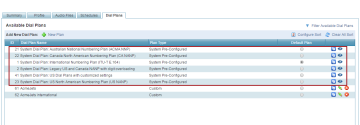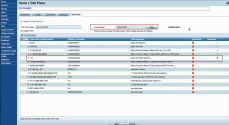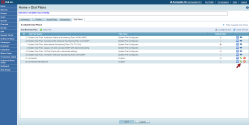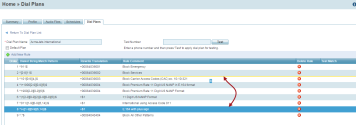Enhanced Dial Plans
8x8 Contact Center dial plans now handle private PBX numbers in addition to full public numbers. New system dial plans are equivalent to prior system dial plans with added support for PBX number dialing. In the new system dial plans, the International Numbering Plan (ITU-T E.164) no longer allows unfiltered pass-through dialing. Dial plans take numbers dialed by users, or numbers originating from other 8x8 Contact Center components, IVR callback, web callback, click-to-dial, workplace phone, etc., and apply editing rules to yield one of the following:
- A valid global public phone number (known as E.164)
- A valid PBX number
- A call disallowed message number
- A warning tone generating number
Features
- Ability to change the order of the rules by dragging and dropping
- Ability to use private PBX numbers
- Ability to use system variables and user-defined variables
- Dial plan editing results are no longer automatically prefixed with a plus (+) sign
A set of new system dial plan rules are designed for 8x8 Work and 8x8 Contact Center tenants. Users cannot edit the system default dial plans, but they can copy a rule and edit it based on their needs.
To copy a system pre-configured rule:
- Log in to 8x8 Configuration Manager.
- Go to the Home page.
- Go to the Dial Plans tab.
- Click
 next to a default system rule that you wish to modify.
next to a default system rule that you wish to modify.
A message appears asking you to click Save to keep a copy. - Click OK.
The dial plan creates a copy of the default plan. - Enter a new name for the Dial Plan.
- Click Save.
A copy of the default dial plan is created and added to the list of available dial plans. You can modify the new dial plan according to your tenant needs.
In 8x8 Work and 8x8 Contact Center, a set of new variables are introduced in dial plan:
| System Variable | Used for |
|---|---|
| $PBXID | VOPBX ID/Name |
| $TENANT | Tenant name |
| $AGENTLOGIN | Agent username if available for the call |
| $ORIGNUMBER | Original dialed number |
For example, using $PBXID variable in your dial plan rule allows you to call any extensions in the PBX that has seven digits or less:
| Dialed String Match Pattern | Rewrite Translation | Rule Comment |
|---|---|---|
| ^([0-9]{1,7})*$ | $1-$PBXID | Send 7 digits or less to the host PBX of tenant |
Note: The E.164 system dial plan is no longer a pass-through. A new rule is added to validate the dialing number.
Users can create variables based on their specific needs.
For example, a user defines SET MYAREACODE variable below for his area code. When he enters a telephone number, the system dials the area code (1510) first and then dials the number.
| Dialed String Match Pattern | Rewrite Translation | Rule Comment |
|---|---|---|
| SET MYAREACODE | 1510 | my area code |
| ^([1-9][0-9][0-9][0-9][0-9][0-9][0-9])$ | $MYAREACODE$1 | add area code |
Backward Compatibility
- All prior dial plans are automatically adjusted to compensate for the plus (+) sign change.
- The original International Numbering Plan (ITU-T E.164) allowed any digit sequence starting with a plus (+) sign to pass through without any digit modifications. The updated equivalent dial plan now includes E.164 number validity checks along with some special and premium number blocking. In some cases, users of this plan may experience a change of behavior if their customary dialing included non-E.164 number patterns.



